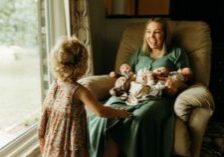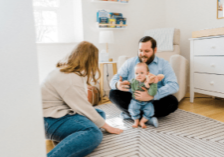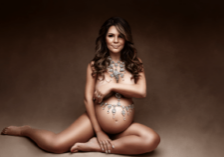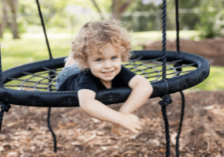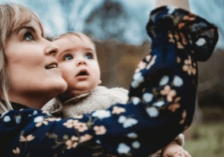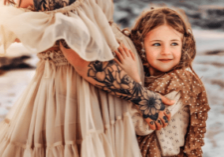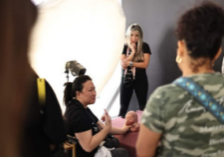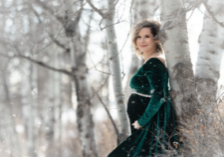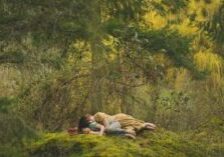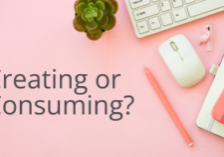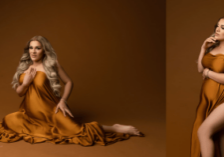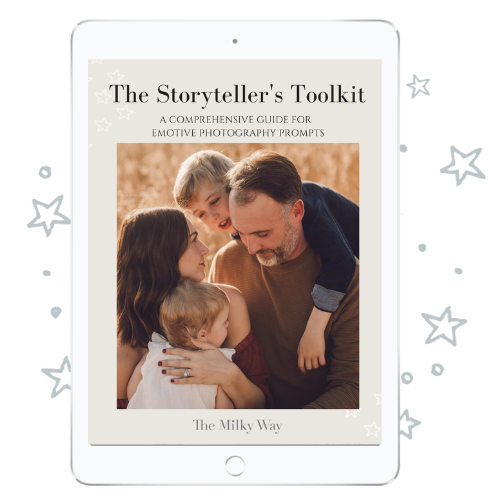Follow your Heart: How to Thrive as a Multi-Passionate Creative Entrepreneur with Photographer Lucy Baber
Have you ever looked around your industry and thought, I don’t fit into this niche? Maybe you don’t want to be boxed into one thing forever and have it define you. Maybe you started out in Industry A, but now you’ve pivoted into Industry B, and actually, Industry C is looking interesting, too. Guess what? You’re not alone in feeling this way.
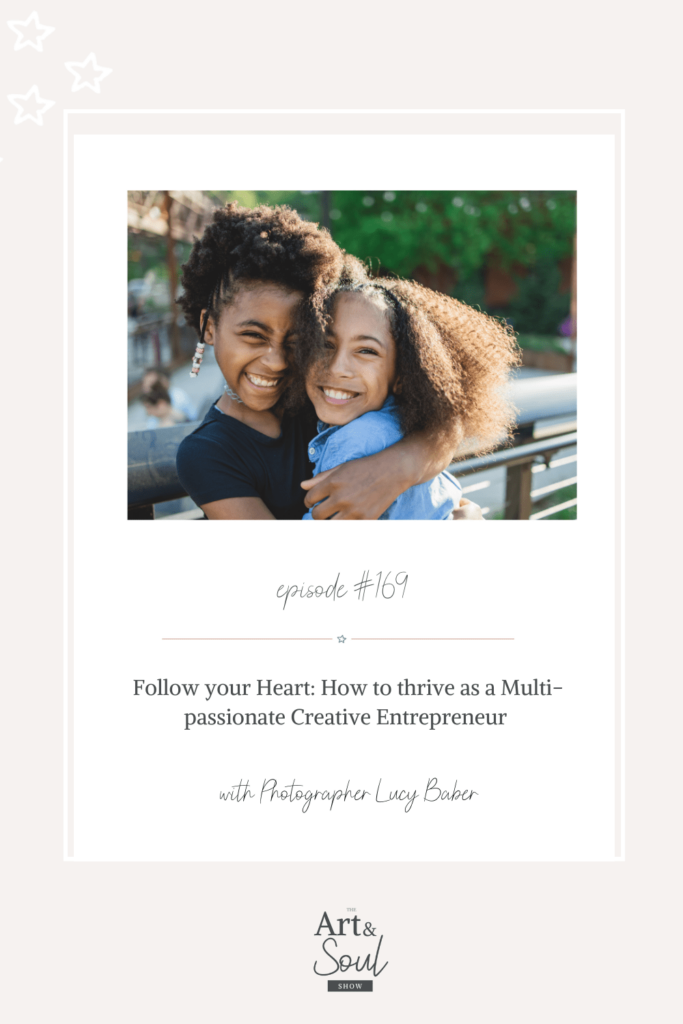
It’s OK to be multi-passionate and have lots of interests and passions. You can do and be more than one thing. You can embrace the messiness and the chaos and the joy that comes with being fulfilled in life and work.
In today’s episode, I’m interviewing Lucy Baber, a photographer, podcaster, relationship coach, and more. In our discussion, Lucy offers insight into not only pursuing your passions (all of them!), but doing so in a way that lights you up, even if it means standing out from the crowd. Don’t be afraid to discover your own superpowers and live an authentic, messy life.
What’s in this episode:
- [02:52] Lucy’s advice on how to embrace being multi-passionate in our businesses
- [05:05] How Lucy helps others discover their own superpowers
- [08:04] How Lucy found her own photography style of being light and fun and less polished
- [11:04] Lucy’s tips on how to find your niche as a photographer or other creative
- [16:24] Why Lucy started her social justice project, 100 Black Dads, and the importance of that work for her
- [20:42] Lucy’s podcast, Midlife Plot Twists, and how so many of us are all going through the same things
- [30:06] Why Lucy felt the need to start a relationship coaching business
Tune in to this episode for advice on embracing the messiness of real life and pursuing your passions (all of them!)!
SUBSCRIBE: Apple Podcasts | Spotify | Stitcher
And if you want to hear more from Lucy and how she thrives as a multi-passionate creative entrepreneur, she’ll be teaching at our online 2023 Family Retreat! (Grab your spot now!)
Resources Mentioned
Book: The Pumpkin Plan by Mike Michalowicz
Book: Big Magic by Elizabeth Gilbert
Meet Lucy
Lucy Baber is a full-time lifestyle family and newborn photographer in Philadelphia. Lucy specializes in joy-filled, emotive imagery that emphasizes family connections over props and poses. In addition to her full-time portrait work, Lucy is also known for her social justice photo project, 100 Black Dads, which helps to highlight the loving, nurturing side of Black fatherhood. As an 11-year business owner, photography mentor, relationship coach, and fellow podcast host (Midlife Plot Twists), Lucy loves helping people uncover their own unique “super powers”.
Connect with Lucy
Listen to Midlife Plot Twists Podcasts
Check out the 100 Black Dads project
Did this episode inspire you to pursue all of your passions and embrace being a multi-passionate human and business owner? Check out this episode from D’Ana Joi Spencer that offers you even more insight on embracing your multi-passionate creative self.
Transcript
[00:00:00] Lucy Baber When I first started out as a photographer, I would look around at people’s portfolios and everything just felt very polished. And then I looked around in my own life and I was like, That’s not really me.
[00:00:15] Lucy Baber I live in Philadelphia. I’m in a very urban area. We have small spaces to live in, and me and my clients, even the most high end clients are living in like row homes. And so indoor light looks different. You go outside and I don’t have big open fields of corn and grass. I have concrete and brick. And so I had to really work with that. It was kind of a combination of like realizing that light is light wherever I go. So I’m going to look for the light first, regardless of what the backdrop looks like. Embracing the it’s not just the mess. It’s also like a little bit of the chaos.
[00:01:00] Lisa DiGeso Welcome to the Art and Soul Show where we dive into heart opening chats on photography, business life and that messy in between. I’m your host, Lisa de Geso, a mom, a photographer and entrepreneur, and I’ll be sharing honest conversations and advice for photographers with insight on mindset, entrepreneurship and creativity. The goal of this podcast is for you to be able to gain insights and strategies that will get you real results. Because let’s face it, having a photography business can be lonely, but it doesn’t have to be. This is the place you can go when you need a boost of encouragement, a kick in the pants and inspiration to pick up your camera. This is the art and soul show.
[00:01:43] Lisa DiGeso Hello, my beautiful friends. Welcome back to the show today. I am super excited to dive into today’s conversation with Lucy Baber. Lucy is a full time lifestyle, family and newborn photographer in Philadelphia. She specializes in joy filled, emotive imagery that emphasizes family connection over props and poses in addition to her full time portrait work. Lucy is also known for her social justice photo Project 100 Black Dads, which helps to highlight the loving, nurturing side of black fatherhood. As an 11 year business owner, photography, mentor, relationship coach and fellow podcast host, the midlife plot twist. Lucy loves helping people uncover their own unique superpowers. Without further ado, here is Lucy. Welcome.
[00:02:29] Lucy Baber Hi. Sorry I gave you a mouthful for the bio.
[00:02:33] Lisa DiGeso Is a good bio. I like it. It tells me so much. But it’s also not like this is Lucy. And she likes cats. Like, you know what I mean? Like, you gave me something to work with.
[00:02:47] Lucy Baber I do like cats, too, but. Yeah.
[00:02:52] Lisa DiGeso So I’m super excited to dive in with you because, Lucy, when you came onto my radar, I knew we absolutely had to connect and have you on the show. Now, what I love so much is that you’re really multifaceted, and I think that sometimes we are so forward facing in our businesses that there is a little bit of a fear to deviate and really talk about all the things that we’re interested in. And it’s honestly, really something that I struggle with too. So do you have any advice just on maybe loosening up and sharing more of my facets? Facets? I really don’t know how to say that word. Well, I wrote it, but I don’t have that. Well.
[00:03:29] Lucy Baber I think for me and one of the things that really kind of set me apart pretty early on in my career is realizing that not all of us have to get into photography to pay the bills right there. There’s a lot of kind of industry norms that people have to do this on the side or as a hobby. And then it just like funds the like spring break or summer vacation trips. And that was never the case for me. It was always like, you know, you got to keep swimming because there’s not really an option to fail. And so what that did for me, though, is it forced me to get really creative with creating different kinds of income streams to really keep me afloat. Because especially when you’re a natural light outdoor photographer like myself, my work is extremely seasonal. And so, you know, it really forced me to look at what are my other strengths, what else can I bring to the table? And not only that, but how else can I help people? Because, you know, again, so often we get kind of like tunnel vision as an artist or as a creative person. And there’s so many pieces to learn in the beginning where you’re starting a business. But once once everything’s kind of in motion and you’re a lot of it’s kind of operating on autopilot. I get a little antsy. I like to try new things.
[00:04:53] Lucy Baber And and I like to see like, where are the pain points for people? What conversations are coming up in my every day that maybe, like I have something to offer and I can help people troubleshoot with that.
[00:05:05] Lisa DiGeso I love that. So interesting. So what also really piqued my interest about you is you really help others discover their own special superpowers. So can you maybe share how you do that?
[00:05:17] Lucy Baber Absolutely. Prior to photography, I was a mental health therapist, which kind of feels like my secret weapon in a way, because so much of my perspective is based in that kind of helping profession, being really intuitive, really checked in to just people. And so what I started to hear more and more over time was feedback. Like, are you really captured like me? Or even better, you really captured my kids. You really like, get them. You saw all those like, little quirks that they have. And now I have these beautiful memories through photography. To look back on. And the more I started to hone in on that, the more I realized I can do this in so many different ways. I can do this through not only taking photos of people, but also by mentoring other people, by coaching, by hopping on my podcast and. And so it really is just kind of like this accentuation of what I do very naturally, which is just like, take a minute, actively listen to the person in front of you, pay attention to how they’re moving and, and really kind of tune into what makes them tick. What is it that really makes them special and how can I? In the therapy world, we talk about like kind of being a blank slate or like a mirror. And so it’s kind of like, how can I be that mirror for them to show them you’re pretty awesome?
[00:06:50] Lucy Baber Like if you haven’t noticed yet, this is what I’m seeing. People respond to that.
[00:06:55] Lisa DiGeso I think I love that because I think like when you’re so close to yourself, you don’t really know what your superpower is. And like, you’re just like most of the time you’re like, I’m an idiot.
[00:07:04] Lisa DiGeso Like, at least that’s me. Right? Like I mean, it’s hard. And I think it’s such a gift because when you’re just looking at yourself and you’re just working with yourself, you’re like, maybe, maybe there’s nothing about me that is super or special. So having that ability to be able to reflect that back to someone, what you see and get them to see it for themselves is so powerful. So that’s I just think that’s incredible.
[00:07:34] Lucy Baber Absolutely. And I think I think you’re right that even like when we’re looking at ourselves, even for me, like it’s hard for me to see who I am accurately from an outsider’s perspective. And yeah, so having those people in your life, whether it’s, you know, a therapist or a great friend or family member or a photographer, somebody who gets you, it’s just like suddenly you’re just kind of like, Yeah.
[00:07:58] Lisa DiGeso It’s like a body. Yes.
[00:08:00] Lucy Baber Yeah, right.
[00:08:00] Lisa DiGeso Yeah, I love that. Yeah, I love that.
[00:08:04] Lisa DiGeso So I love looking at your photography work because it is so joyful. It’s unpaused and playful. So can you share a little bit with our listeners how you found your own photography style? Because I know it’s so easy to fall into the trap of everything must be perfect. And from your approach, it seems like everything must be fun. And that honestly just looks and feels so much lighter.
[00:08:26] Lucy Baber Absolutely. Yeah. I mean, you know, another thing about when I first started out as a photographer, I would look around at people’s portfolios and everything just felt very polished. And then I looked around in my own life and I was like, well, it’s not really me.
[00:08:46] Lucy Baber I live in Philadelphia. I’m in a very urban area. We have small spaces to live in, and me and my clients, even the most high end clients are living in like row homes. And so indoor light looks different. You go outside and I don’t have big open fields of corn and grass. I have concrete and brick. And so I had to really work with that. It was kind of a combination of like realizing that light is light wherever I go. So I’m going to look for the light first, regardless of what the backdrop looks like. Embracing. The it’s not just the mess. It’s also like a little bit of the chaos, because I do work with a lot of families with young children. I don’t know.
[00:09:36] Lisa DiGeso I have one. He’s 13.
[00:09:38] Lucy Baber Okay. So so you’re kind of in the same life space as I am. My boys are nine and 12, but when they were like two, like they were in my face just 24 seven and I loved it. But life didn’t look neat and polished and like everyone sat still. It looked like kids climbing in my lap, probably like skipping a nap and crawling all over my face you know, just like being goofballs. And I realized that’s the perspective I wanted people to have in their memories. I wanted them to remember what it felt like, not just what the physical features of each person look like, but what does it feel like. And so, you know, when I am working with a two year old, they’re going to climb in your lap. I’m going to let them play. They’re going to throw leaves on your head. They’re going to run around in circles because that’s what they want to do. And that’s really where you’re going to get the most authentic smiles is when they’re being themselves. I tell people all the time, if you smile for a camera, you don’t know that camera.
[00:10:39] Lucy Baber You’re just going to. You know, geez, you’re just going to like me. But the more I get my clients, the people I care about looking at each other in front of the camera, the more it has that exhale moment, the more authentic everything feels. So my style was really born out of those two things, you know, my, my physical location and also just that authentic vibe that I wanted to capture.
[00:11:04] Lisa DiGeso I love that. I love that when I read your bio and when I was doing the intake, there was something that you wrote that I really felt so deeply and I thought it was so, so beautiful and it was my style isn’t very neat and polished even as a person. My personal style is more edgy. Alternative Instead of the typical white suburban mom photographer type, it’s so common online. I didn’t always feel like there was a place for me in the industry. It took me a while to really find and understand my need. I think this is such a relatable statement. So can you share maybe any tips you have for our listeners that might be struggling with this too?
[00:11:41] Lucy Baber Yeah, it really was. You know, not just an evolution of my photography style, but just kind of a notion of myself as a person learning who I am and who I am not. You know, one of the early exercises I did as far as like personal branding was to look at your closet and try to find patterns in there. You know, like, do you have a lot of bright colors? Do you have a lot of neutrals? Do you have a lot of Black stripes like I do?
[00:12:11] Lucy Baber You know, like, like, Yeah, yeah. Like looking. Yeah, like actual authentic. Look around your house, Everything. I mean, you know, this is not polished behind me, but all the color choices are very intentional in my life. I realized I’m drawn to a lot of, like, turquoise and jewel tones, and. And so I started to really kind of guide my clients towards that as well. And the more I showed that, the more they kind of caught on like, Oh, this is what’s going to make a really beautiful, bright, colorful, saturated photo is if I wear these same kinds of colors. And then also think about all the kinds of media that you consume, all of the esthetic choices that you make. I’m a weirdo.
[00:12:53] Lucy Baber You know, And like. A lot of, like really weird artsy movies and stuff. And when I’m looking at art, I’m really drawn to more modern shapes and esthetics. And so the more I kind of showed that in my portfolio, the more I kept attracting the people who get it, who get my brand of weird. Yeah, I just kind of started to merge a little bit more. Now when I’m location scouting, for example, I’m looking for Philadelphia has a fantastic mural mural arts program. And so we’re constantly coming up with new brightly colored walls all around the city. And I’m looking for them all the time. I’m the weirdo who’s like, Oh yeah, we’re going to meet at the blue wall by the place. And people are like, I don’t know who. You’re talking about.
[00:13:39] Lucy Baber But it’s just it’s on my radar now. And so I’m always working those things in. But the other piece that I do a lot with, with mentoring clients in particular is looking at your actual portfolio. So when I’m working with somebody to kind of discover their brand, I’m looking at I’ll put maybe 20 of their favorite photos up on a screen and I’ll go through and I’ll say, you know, you use a lot of hard light. Have you ever realized that you’re using a lot of hard light or you use a lot of like rich shadows or your style is very bright and airy, and here are the ways that you’re like you’re constantly looking for beautiful backlight or whatever. I’ll even go down to the colors. I’ll say, Did you notice that you always have a pop of red in your photo? And people are like, Oh gosh, I never noticed that. Or did you notice that you like you like to take a lot of photos of people’s hands, whatever the patterns are, that’s what you’re looking for to kind of figure out, who am I? What do I like?
[00:14:39] Lisa DiGeso I love that so much. And I think what’s so important too, is when you’re able to tap into that, you’re probably a lot less distracted by what’s popular or what’s trending like in the industry or like on social media. Like the boho dresses in orange, people like that’s going to come and go. Right. We’ve seen purple people years ago and green and neon grass like things come and go and that’s okay. But when you know who you are and you kind of embrace your inner little weirdo, I think that you kind of just stay true to yourself. So I love that.
[00:15:10] Lucy Baber Yeah. And that, you know, another exercise I did after I had been established as a brand and as a business for several years, I did a kind of secondary, like another layer where I reached out to some of my most loyal clients, the people who I had worked with annually for the past, like five or six years. And I said, Where do you shop? What do you look at when you’re like picking a brand for anything, even outside of photography? And once I got kind of that data as well, I was able to hold my esthetic up to those other bigger brands, and it all made sense. I was like, Yeah, I’m still I’m still on the right track. You know, I’m still matching this aesthetic. And this is why people keep coming back because they know I’m going to have consistent results and it’s going to match what they’re looking for.
[00:16:00] Lisa DiGeso I love that because I love pink, I love soft. I’m a hopeless romantic like. And I think if you were to look at my work, you be like. Oh, that makes sense. Yeah.
[00:16:12] Lucy Baber And it’s so exciting to realize, like, you don’t have to make a brand. You just have to identify it. Like you’re not pulling anything out of the air. It should just be you.
[00:16:21] Lisa DiGeso Yeah, I love that. Oh, do you see? I love it. So can you share a little bit about the project that you’re working on? Because I love this so much. Can you share about your social justice project with 100 black dads, how you started it, how it’s going, and the importance of this work to you?
[00:16:38] Lucy Baber Absolutely. This project has been several years in the making. I think I started it in 2016, which sounds like two years ago, but it’s been a while now. When I say it out loud, I’m like, gosh, that’s almost A.D. Browning ten years.
[00:16:55] Lucy Baber At some point, I really just started to get the idea. And this this idea really shapes most of who I am and also all of the different branches, like of my umbrella kind of brand. I started to realize that we make sense of life and our purpose and where we fit in, in life based on the kinds of stories that we consume. And there are lots of stories that me and my friends might be exposed to here in Philadelphia that somebody who lives in, like the middle of Wisconsin or Indiana or wherever might never hear. And so, you know, we’re all kind of making sense of life based on these stories, but we’re all only consuming. The small amount of stories we’re only exposed to so much. And it really hit me around that time. My in-laws live in middle of nowhere, central Virginia, and they only in the past, like 2 to 3 years, finally got consistent Internet to the point that they can now stream shows. Before that, they were still like, still completely like whatever’s on net network television, you know, on a Tuesday night is all they have for options. And so I would go and stay like the week with my kids. And I realized, oh, on a Tuesday night in the middle of nowhere, Virginia, my options are lots of like cop and criminal drama. Yeah. Stories. You know, like, those are my options for like, weeknight TV and I’m not that’s not really my thing. And I realized, oh, like, if I. Lived in this place and all of my friends and family are white and I only really know other white people. And then I go on TV and I turn on the TV, and most of the stories I’m hearing really vilify people who don’t look like me. Those are the stories that I’m consuming. Those are the ideas that I’m shaping in my head. And I’m going to interact with the world based on that, those assumptions.
[00:19:04] Lucy Baber And so it really came down to how can I get different stories out there? How can I expose people to just a different narrative? The project took a couple different shapes in my head. At first I was going to do just black men or black couples or, you know, whatever. But like the bottom line is my life looks very different than somebody else who lives in a different location. My kids at nine and 12 are now almost the only white children in their classrooms. And that’s intentional on my part. I wanted them to, you know, really feel exposed to people who look differently than they are. But I would sit at the playground after school and I would see all of these fantastic black fathers picking up their kids, putting them on the swings, you know, reminding them to put their coats on. I just one of those stories out there. So, yeah, I started taking pictures of it. I said, What do I know? I know how to take pictures of families having fun. And so I started doing that. And now my math is so strong, you would think I should know from 2016 to 2023. That is seven years, seven years, then seven years in, I am still working on it. It’s a little bit more of a trickle as opposed to a steady stream of new content all the time. And that’s really just because I saw bills to pay this project though. So when I’m able to, I still add on to it. But you know, it’s still it’s still active, it’s still going. I still take. Volunteers.
[00:20:33] Lisa DiGeso I commend you. I think it’s an incredible project. And I, I love how you share the story on the reasons behind it, because I think it’s it’s really is so important that we’re getting those stories out there, too. So can we share a little bit? Can you talk about about your podcast, Midlife Plot Twists? Because as a 45 year old woman, this show is my jam. Something I have been struggling with is aging in front of the camera. I’ve been the face of our company for over 12 years. I’ve gained weight and I’ve lost weight. I’ve dabbled with Botox and fillers and hair extensions. And to be honest, there is not a lot of support or resources for women like me that are the face of a company with longevity. They get to slowly watch them age over time. And to be honest, it’s really hard. It’s really hard. I’m far too hard on myself, and I find I don’t really show up as a sparkly as I know my potential is because I’m so worried about how I’m presenting myself, how I look. So do you have any advice on this, girl?
[00:21:29] Lucy Baber Yeah, I mean, the podcast Midlife Plot Twists was really born out of just what I kind of what I said earlier. Like I started realizing I was having the same conversations with my friends day in and day out. Like we would go a month where every like all these different kinds of friends, you know, they don’t know each other. They know this is my kind of Groundhog Day moment. But like, we would just go like a whole month where every conversation was, What are you doing about your grades? Are recovery good still? Are we done with that? And then, you know, the next month it was like, tell me about perimenopause. Am I immediately like, why do I keep having to go to the doctor for all this stuff? And, you know, then bigger life stuff happen. And a lot of my friends started having, like major relationship changes. I’ve had several close friends who got divorced, and we’re all just kind of navigating this together. And I realized I am the kind of person who goes deep. I don’t really do small talk.
[00:22:27] Lisa DiGeso I know I love it. You know, I don’t either.
[00:22:31] Lucy Baber Every time I’m like, having that. I’m like having a conversation. I’m like, Well, we could talk about the weather or we could talk about our gut health. It’s like. Yeah. So I realized, like, if that’s my job, if that’s who I am, I could just record this and then I don’t have to keep repeating myself all the time to all these different people. It’s there, it’s a resource. And so I’ve interviewed a wide range of people where we’re just on the tail end of season two now, and we’ve talked about all sorts of things. I’ve interviewed people who have come out as gay later in life. I interviewed somebody who really sad, had a was diagnosed with a terminal illness, and as a mother in her forties, she was facing all of these major life changes and she has since passed. But she was very frank and and very honest with me about that whole process. I’ve interviewed health professionals and and people who have made major career changes. And and it’s really just fascinating to. Just. Again, go back to my therapy background in the therapy world. They they use this term a universality. And it’s really just a word to describe the fact that like anytime you’re in a room with like 50 people, odds are you’re not the only person thinking whatever you’re thinking. Like, there’s just always kind of like common bonds between even total strangers. We’re not. As weird as we think we are, we’re not as unique. You know, even like, the worst of circumstances are, we’re not the first person to go through that. And I really wanted people to get that message that you’re not alone. We’re all making it up as we go. We’re all figuring it out.
[00:24:19] Lucy Baber And, you know, as far as the aging thing, I won’t necessarily respond specifically to that because I don’t have all the answers. But what I have learned in my interviewing lots and lots of people is it seems like we all learned what it looks like to get older from somebody, whether that’s a parent or grandparent or an aunt or a mentor, you know, a neighbor. We all watched somebody go through this before. And a lot of times what I’ve realized is we shape our ideas again, going back to the stories that we were exposed to. We shape our ideas about what this is supposed to look like based on the models that we saw do it already. And so if your mom or or whoever was that significant figure went through her forties and really had a hard time of it and didn’t really figure out like how to show up authentically, then that probably is going to stay a struggle for you until until you kind of try to find a way to shift the narrative. My particular struggle and I just turned 40 last year, so, you know, in the beginning of my forties, but even since 35, my struggle was not so much physical changes, although my body, you know, is getting older and health stuff is a real pain.
[00:25:37] Lucy Baber But my bigger concern was I hate throwing my mom under the bus like this because she’s a lovely woman and I love her very much. But when my mom was in her forties, I just watched her go to work, come home, fall asleep on the couch, watching old movies and like, rinse and repeat, right? Like, it was just like it was it was just kind of like the dead zone of you. Like, you just you’re tired. You’ve got all these balls up in the air and you’re tired and you just kind of check out at the end of the day. And as I was approaching my forties, I realized that’s not really me. I’m still kicking that didn’t want to go out. I feel like I’ve kind of got like a whole, like different mentality where I’m like, I want my kids to know that life doesn’t end at 40, and the way that I’m going to teach them that is to show them that Mommy’s going out tonight. And so and that’s really I think the the bigger piece is like wrestling with what stories? Where are you shown and then what are you going to do about that? Or do you want that to be your life or do you want to, like flip the story and change it up? And so that’s really the common bond that I’ve heard time and time again through all these different stories is just life is going to throw you curveballs. What are you going to do? Do you want that to be your curveball or do you want to throw it back and say, Nope, I’m going to do it my own way?
[00:26:58] Lisa DiGeso I love that so much. Like the I just had the like massive light bulb moments because of that, because my mother, even now, I love I love her. She makes me delete photos of her. She’s like, nope, nope, nope, nope, nope. Like, just hates it. And I and so I grew up with that. And my grandma, like, never went anywhere without her lipstick and, like, talked every day about how much she hated aging. So, like, it’s a program that I’m running that I didn’t realize I’m running, but now I know that the programs there, I can do something about it.
[00:27:28] Lucy Baber Yeah. Yeah, I, I think this is. Maybe. Revealing a little bit too much about myself, but I probably take in more selfies since I turned 40 than at any other point in my life because I just reached a point where I was like, You know what? No, I look good. I’m not going to lose my life. I’m going to capture every minute. Of it.
[00:27:48] Lucy Baber Because why not? Like, I really for me, I’ve reached a point where I was like, there’s not actually really anyone keeping very close tabs on you as an adult, Right? Like, you can make this up any way you want. And there’s, you know, depending on your belief system, there’s not really anyone waiting at the other end to give you a gold star. So, like, what are these roles we’ve made for ourselves? Who said to stop taking selfies at 40?
[00:28:17] Lisa DiGeso My gosh, I love.
[00:28:18] Lucy Baber Know, so I’m going to keep doing it.
[00:28:21] Lisa DiGeso So true. I was having I was having lunch with a friend and she is like she is sometimes vegan, but she, like, wants everyone to be like, no, she’s a vegan. But this day she’s like, she wanted she wanted a chicken sandwich so bad she’s like, But I can’t have it because I’m vegan. I’m like, like, you’re not going to get an award for the best vegan. If you want, she can have chicken, man. Look. Yeah.
[00:28:46] Lucy Baber Yeah, exactly. And you know, that seems so obvious to you. And I’m like, seems like you and I both need chicken, but. Right. And so many of my friends are in that same place with other things, you know, like, I am not really in a. Place where I’m like, dealing with a lot of gray hairs. But I have friends who are like really Gray now, and they’re like wrestling with like, how do I shift into this life space? I’m like, Do you want to do it or not? Like, do you want gray hair? Then go, right. If you don’t, then don’t go gray. I don’t care if you do your. Hair like people. Like these are all fine.
[00:29:24] Lisa DiGeso Yeah. It’s so funny how we just think this. Like, I guess it’s like the spotlight syndrome, where we think, like, everyone is just paying attention to everything we say or do, and it has such impact, and everybody thinks that way. And we’re so busy looking at ourselves that we’re not paying attention to anyone else. So don’t worry about it, man.
[00:29:43] Lisa DiGeso Right, Right.
[00:29:44] Lucy Baber Yeah, yeah, yeah. People really are not paying that close attention. And if they are, then get ourselves might drop.
[00:29:54] Lucy Baber Love it. Right. And like.
[00:29:57] Lucy Baber Like, Yeah, definitely having flashbacks to, like Bonnie Raitt.
[00:30:01] Lisa DiGeso Talking about like. Yeah, I love it. I love it. It’s so great. So you have a new relationship coaching business, so can you share a little bit more of that?
[00:30:11] Lucy Baber Yeah. So. So it’s still a baby. I decided, you know, after doing one business for 11 years, I had to, like, mix things up and start from scratch again, which is a learning curve in itself. But going back to the beginning of the podcast, the podcast was never intended to be its own thing in and of itself. It was always kind of like, Am I going to be a photographer when I’m 65? Yeah, I don’t really know. Am I going to want to like, get down on my knees and like, play with two year olds and chase after the little ones? Maybe, maybe not. But like, there’s lots of other talents that I have. So the podcast was intended originally to kind of feel that out. Just feel out like, where is this going to take me? Like maybe I just start talking to people and, and the universe will kind of like open things up from there. And as I’ve kept doing it and kept kind of like following the stories and seeing what people are up to, I realized that, you know, there’s a lot of especially after the pandemic, there’s a lot of people with like major relationship changes, whether that is divorce or figuring out how to talk to their teenage kids or their friendships have changed or whatever. Like it’s just it’s not I specifically did not call myself a dating coach because there’s so much more to relationships than just like starting like, let’s maintain them, right? And so I drawing on my background as a therapist and and my conversations with my peers, I realize we’ve got some communication in. The. Society.
[00:31:49] Lucy Baber There’s a lot of kind of knee jerk assumptions that people bring into their relationships, and we don’t know how to talk about them. We don’t know how what healthy conflict resolution looks like. Again, a lot of us are kind of fumbling through and basing a lot of our assumptions on what did our parents do, what did our grandparents do. Probably they didn’t know any better either. And so we’re still kind of like perpetuating the cycle of like unhealthy habits. And I just really wanted to help people figure out what to do about that. Because as somebody who’s watching, like some of my very closest friends figure out how to be in relationships with new people again, because they’re back in the dating pool, they’ve they’ve done their divorce thing and they’re they’re back out there. You know, I’ve realized you’re going to keep attracting the same kinds of people. You’re going to keep attracting the same issues and problems if you don’t nip it in the bud at the source, which is like, how do you talk about your own needs? How do you work through conflict with other people?
[00:33:01] Lucy Baber And so so the of relationship coaching is called get unstuck relationship coaching, and it’s going to be me just helping people figure that out. You know, like you can go to a therapist. But the downside of that for me is there’s a lot of red tape when it comes to professional licensure. And I’m also bound by my state as a therapist. Whereas if I want to coach, especially with all of us kind of hopping online and doing this virtual thing, I can help anyone anywhere. I can help groups of people in different locations. I can hop on social media and and offer insights and tips. And so, yeah, like I said, it’s still it’s still in the beginning phases, but I’m really excited. I’ve gotten a lot of positive feedback and people saying like, Oh, I never thought of it that way. Even just from like my social media presence so far. And my goal is to put together some workshops and group coaching. Variances and then you work more with people one on one over time. But. That’s for starting a business.
[00:34:10] Lisa DiGeso It was so brave. I love it.
[00:34:12] Lucy Baber It’s me right now. It’s like.
[00:34:14] Lisa DiGeso So are you doing that and running your photography business simultaneously?
[00:34:17] Lisa DiGeso Yes. I love it.
[00:34:20] Lisa DiGeso You’re a girl after my own heart.
[00:34:27] Lucy Baber People. People look at me and they’re like, You’re just though that still do you? And it’s like, I really. It’s not that I don’t sit still. It’s that my brain doesn’t sit still, and I just keep thinking of these new ideas. And so.
[00:34:40] Lisa DiGeso Yeah.
[00:34:41] Lucy Baber I try things. I’ve tried lots of things. They don’t always stick, but I’m really excited about this one.
[00:34:47] Lisa DiGeso Well, I wish you the best with it. It sounds incredible. So you ready for a lightning round?
[00:34:51] Lucy Baber Mm hmm.
[00:34:53] Lisa DiGeso Okay. Coffee or tea?
[00:34:55] Lucy Baber I don’t have lightning answers. Coffee in the afternoon. Tea in the morning.
[00:34:59] Lisa DiGeso That’s okay. Okay, No problem. Favorite show as a kid?
[00:35:05] Lucy Baber Oof. Garfield and Friends.
[00:35:09] Lisa DiGeso Oh, good one. Last thing you did for yourself as an indulgence?
[00:35:15] Lucy Baber Indulgence is such a hard word. I put quality time with good people on the calendar.
[00:35:22] Lisa DiGeso Uh, that’s a good one. Yeah, that’s. Nice. Yeah. Morning person or night owl?
[00:35:28] Lucy Baber Night owl. Like mega. Night owl.
[00:35:34] Lisa DiGeso Am I trying to train myself just to be like a in the middle or where? Like I just sleep like between, like 11 and seven? Like, that’s where that’s my goal.
[00:35:45] Lucy Baber The pandemic gave me a lot of leeway and I have not recovered yet. And you know what? I work for myself, so I’m trying not to feel guilty about it, but I am like sleep 2 a.m. to 10 a.m. girl.
[00:36:01] Lisa DiGeso Right? Whoa.
[00:36:04] Lucy Baber Yeah. I’m living my best college life right now.
[00:36:07] Lisa DiGeso I love it. Yeah, you are. That’s awesome. What did you want to be when you grew up?
[00:36:14] Lucy Baber Okay. So my mom has an answer, but it’s not as cool as my answer. So my official answer is I wanted to be an interior decorator. But my mom tells me that when I was really little, I used to say I wanted to be a singing housewife, which is so lame, but also kind of true.
[00:36:38] Lisa DiGeso It’s so funny. Well, I guess when I was seven or eight, my dad, I got sick of everybody asking me. And I had told my dad I wanted to be a washroom attendant. And he still thinks it’s the funniest thing he tells everybody. Like, I like at least it’s but like. And I’m just like, Oh, my gosh, Dad. No shame out there if you’re a washroom attendant. Everybody’s love it.
[00:37:01] Lucy Baber Yeah. Exactly.
[00:37:02] Lisa DiGeso Which they wrote. Right.
[00:37:06] Lucy Baber That’s awesome.
[00:37:06] Lisa DiGeso Oh, dear. What do you like to cook the most? If you like to cook.
[00:37:12] Lucy Baber Oh, I don’t. But this is. I swear I’m not sponsored. But I have recently discovered Hello, Fresh. And I’m a little bit obsessed. Oh, so I hate cooking, but I tolerate Slash. Kind of like. Hellofresh.
[00:37:28] Lisa DiGeso Oh, I like it. Yeah. I’m obsessed with my airfryer to the point where I tell everybody about my air fryer, and if I started an MLM, it would be for air fryers.
[00:37:40] Lucy Baber Okay. Well, I thought we were going to get my air fryer.
[00:37:45] Lisa DiGeso Costco. What’s the best gift you’ve ever received?
[00:37:57] Lucy Baber Oh, okay. One that I asked for. It wasn’t like a surprise gift, but I was really excited. I asked for my car to get detailed for my birthday one year and it was awesome. I couldn’t ask for that every year, really.
[00:38:13] Lisa DiGeso Right. Yeah, that’s a good one. I like that. Yeah. When it just comes back and it smells clean, like, I don’t know, my car smells like someone died there. Like. I mean, I don’t know what I do in there.
[00:38:24] Lucy Baber Always. Goldfish crumbs. Like in the back seat. Yeah. No, And I didn’t know it could get that clean.
[00:38:30] Lisa DiGeso French fries.
[00:38:32] Lucy Baber Yeah, right. Yeah. So car detailing for the win.
[00:38:37] Lisa DiGeso I love it. I love it. What is something you’ve accomplished as an adult that your younger self would be proud of?
[00:38:45] Lucy Baber My younger self had a very narrow worldview, so probably just broadening my worldview. I’m not sure that she would have gotten it, but I get it now. Younger Self would have been really proud of my career and my parenting, and I still am. I’m super proud of both of those things. I think that I’ve raised two fantastic, very bright, creative, loving boys and and I somehow managed to keep paying the bills. So that’s the. Way.
[00:39:20] Lisa DiGeso I love it. So what’s the best piece of business advice you’ve ever been given?
[00:39:26] Lucy Baber Mm. I have two, and they’re both based on books that I read. The first was the book The Pumpkin Plan, which basically just talks about how in order to make things grow in your business, you have to be willing to do some pruning. And so people talk about like me sitting down and and specializing in specific things or also just raising your prices, that you’re making a living wage. And sometimes that means doing a little bit of pruning because not every client can afford it, But being willing to prune back was a big one. And then the other one came from Elizabeth Gilbert’s book, Big Magic. As somebody who has all the ideas all the time, and my brain is constantly thinking up new crazy things to do next. I love that. Well, my takeaway from her. Book, I don’t know if it. Was her intended message or not, but my takeaway was, it’s okay to let things go. Sometimes it’s okay. You don’t have to chase every single idea that crosses your mind. And if it’s meant to be, that idea will keep floating around in the universe and maybe somebody else will pick it up or it will revisit you at a different time. But like, you don’t have to solve all the world’s problems. 24 seven.
[00:40:44] Lisa DiGeso I love that. That’s a great take away from that. I agree. That was good. Because I was way too many ideas too for my own good and like that. Just think that kind of that reassurance that, well, if I don’t do it, someone else will. And that’s good.
[00:40:56] Lisa DiGeso Yeah.
[00:40:57] Lucy Baber Yeah. It really gave me permission. And I don’t know if everyone experiences their brainstorm ideas that way, but for me it really felt like. But if I don’t, then it’s not going to happen. And it was just like lots of, like, tension and like, holding on to things and yeah, and that kind of just allowed me, like, hold things a little more loosely. Just let it flow a little bit more because I’m pretty type-A, so going with the flow is a learned behavior.
[00:41:26] Lisa DiGeso Yeah, I agree. I love it. So where can our listeners learn more from you?
[00:41:32] Lucy Baber Yeah. Probably the best way is to follow me on Instagram at Lucy Baber. I do tend to cross post some of my other projects and things on there. So if you follow, then you’ll also see that I’m cross posting a lot of my get unstuck coaching stuff on there. And that’s it’s an annoying tag to share because it’s got underscores and I don’t it’s like underscore get underscore unstuck. So just follow me at Lucy Baber and you’ll see all the other. Goodies you’ll find me. And again with that 100 black Pads project as well, I cross post that stuff on there as well and my website is always a good resource for photography needs. So that’s just Lucy Barbour photography dot com.
[00:42:18] Lisa DiGeso I love it. Lucy’s actually going to be one of our amazing instructors as well for the 2023 online family retreat. So can you share a little bit what you’re teaching on?
[00:42:28] Lucy Baber Yeah, we’re getting like right into it. I’m going to be creating videos of some of my family sessions so that people can see behind the scenes of me working with families, with young children, getting them all to loosen up and actually have fun. And then I’m going to hop on my computer and do some editing for some of the photos.
[00:42:47] Lisa DiGeso I love it. Oh, I can’t wait. Well, Lucy, thank you so much for joining me today.
[00:42:51] Lucy Baber Thank you. I had so much fun. This was a really great conversation.
[00:42:57] Lisa DiGeso It was so good. So actually, I have one last question because I always love to ask this last question for my interviewees. And what are you currently curious about artistically curious about?
[00:43:09] Lucy Baber Well, so my partner is an aspiring filmmaker and I’ve always kind of put off that whole learning how to do videos and stuff, but just as like something to do to play around. We’ve been making short film clips to hopefully teach me some video stuff. So artistically I’m very curious about filmmaking, videography and just learning how to put it all together. I’ve never dabbled in this before except for like Instagram reels, which is like kind of full of once you figure that out. But like, you know, even something as simple as he was trying to explain to me, like, you can’t while you’re like, filming something in motion, you can’t just like, cut. You have to like, transition to a thing that maybe it’ll cut into the next to, like maybe you pan up to show the sky and then the next scene is the sky down. I was like, I never thought of it that way.
[00:44:14] Lisa DiGeso Hey, Yeah.
[00:44:15] Lucy Baber Because, you know, I’m so used to, like, electronic photos, so. Yeah, very excited about that and probably will. It’s like the one true hobby I have that I haven’t monetized yet, so I’m hoping. To keep it that way.
[00:44:26] Lisa DiGeso I love it. You’ll love it. What you’ll notice because I love video and I actually do almost all of our video editing and stuff. And what you’ll really notice is when you’re watching movies, you’ll start watching how it’s filmed. Yeah, it’s like fun.
[00:44:40] Lucy Baber I’m obsessed with movies. Like, I kind of I’ve watched way too many. So I have started noticing and I especially I learn the most. I really love really bad ads and retro stuff and the really low budget ones. I’m like, Ooh, I could do better than that. Look at them. They think they’re doing something cool, but I am on to them now.
[00:45:05] Lisa DiGeso I love it. Well, Lucy, it’s been a pleasure. Thank you so much for being on the show today.
[00:45:10] Lucy Baber Thank you so much. And I’m so excited about the conference.
[00:45:13] Lisa DiGeso Oh, my beautiful friends. Thank you so much for tuning in today. I am sending you so much of my light and love today and every single day. We will see you next time. Have you ever wondered how some people seem to effortlessly connect with their clients? My guess is that they’re using their unique superpower to their advantage. When you allow more of you to shine through, good things can happen. Now discover your special superpower with our handy dandy quiz at themilkway.ca/quiz.
share the love
[Sassy_Social_Share]
recent
Podcasts
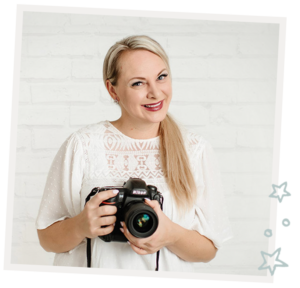
I'm
Lisa DiGeso
I’m on a mission to create uplifting online experiences for photographers ready to elevate their art, their business and their mindset.(...and have fun along the way!)

